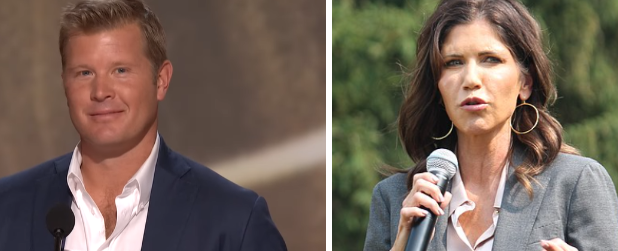
- Details
- By Levi Rickert
Native Vote 2024. Montana GOP senatorial candidate Tim Sheehy, who is already in hot water with Native Americans in Montana and nationally for his racist and disparaging comments about Crow Indians, is touring Montana this weekend with anti-Native American South Dakota Governor Kristi Noem (R-SD).
Conservative Montana Talks reports that the two will tour the state with three rallies on Sunday in Billings, Great Falls, and Kalispell.
The tour most likely will do anything to win Native votes for Sheehy who is running against incumbent U.S. Sen. Jon Tester (D-MT), who is seeking a third term.
Sheehy got in hot water with the Montana tribes after it was revealed that in a couple of recorded audio clips, he was caught making fun of Native Americans. Last November 6, 2023, he was recorded at a fundraiser bragging about roping and branding with members of the Crow Nation. He says “it’s a great way to bond with the Indians while they’re drunk at 8:00 a.m.”
The recordings caused the ire of Native Americans with a rebuke from the Crow Nation, several Native American groups in Montana and from the National Congress of Americans, the largest Native American national organization, based in Washington, D.C.
Montana tribal leaders have demanded Sheehy to apologize about his racist comments. Instead, ex-Navy Seal Sheehy has shown no courage when it comes to dealing with the tribes in Montana. He has completely ignored the tribal leaders’ demand and now is teaming up with Noem to help his election effort.
The teaming does little to help Sheehy win support from Native Americans in Montana. The South Dakota governor is banned from six of the nine federally recognized tribes in the state. In land mass combined, the reservations of the six tribes make up almost 20 percent of South Dakota.
Noem, who was mentioned a possible running mate to former President Donald Trump on the Republican ticket, is the same governor who in her autobiography revealed she had killed her personal dog,
In the book, Noem describes killing “Cricket,” a 14-month wirehaired pointer that Noem writes had an aggressive personality.
Noem deemed Cricket as untrainable to be a hunting dog because she went "out of her mind with excitement” during a pheasant hunting trip. Upon return from the trip, Noem says Cricket killed another family’s chickens. When Noem attempted to stop Cricket Noem was bitten by the dog.
One of the rallies will be held in Kalispell about 100 miles from the Blackfeet Indian Reservation. Tom Rodgers (Blackfeet), a Washington, D.C. strategist and Native American advocate, says perhaps Native Americans in the state should hide their “rez” dogs this weekend.
In 2022, Tester, who sits on the U.S. Senate Committee on Indian Affairs, helped to secure historic funding for Indian Health Service (IHS): an increase of $297 million over the previous year’s funding.
In Montana, there are eight federally recognized tribes and seven Indian reservations. And, there are 74,130 Native American of the voting age in the state, according to Four Directions Native Vote.
Sheehy is in a tight race against three-term U.S. Sen. Tester (D-MT), a member of the U.S. Senate Committee on Indian Affairs. In an article published on Friday, August 30, 2024, Sheehy leads the race by 3.5 percentage points in an average of 13 polls, according to The Hill.
More Stories Like This
Native News Weekly (August 25, 2024): D.C. BriefsNavajo Nation Mourns the Passing of Former Vice President Rex Lee Jim
Deb Haaland Earns Endorsement From Communications Workers of America Local 7076
University Soccer Standout Leads by Example
Two Native Americans Named to Democratic Congressional Campaign Committee's“Red to Blue” Program
Help us defend tribal sovereignty.
At Native News Online, our mission is rooted in telling the stories that strengthen sovereignty and uplift Indigenous voices — not just at year’s end, but every single day.
Because of your generosity last year, we were able to keep our reporters on the ground in tribal communities, at national gatherings and in the halls of Congress — covering the issues that matter most to Indian Country: sovereignty, culture, education, health and economic opportunity.
That support sustained us through a tough year in 2025. Now, as we look to the year ahead, we need your help right now to ensure warrior journalism remains strong — reporting that defends tribal sovereignty, amplifies Native truth, and holds power accountable.
 The stakes couldn't be higher. Your support keeps Native voices heard, Native stories told and Native sovereignty defended.
The stakes couldn't be higher. Your support keeps Native voices heard, Native stories told and Native sovereignty defended.
Stand with Warrior Journalism today.
Levi Rickert (Potawatomi), Editor & Publisher


